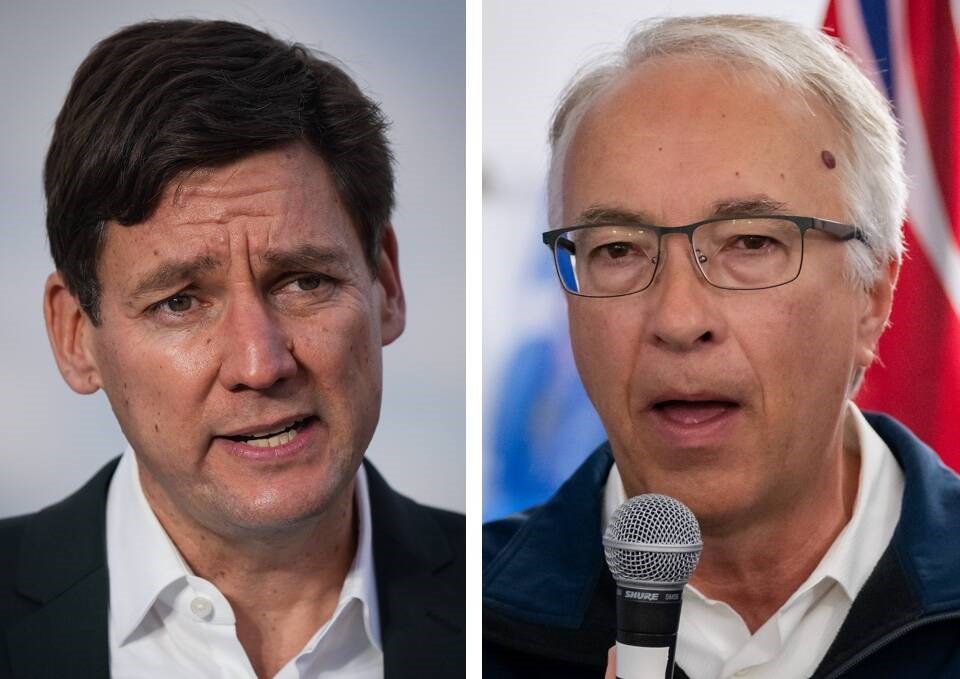There was a moment at the B.C. NDP convention in Victoria last November that resonates, as the election campaign concludes.
David Eby had been NDP leader and premier for a year when he took centre stage. He was preceded by a video tribute from an assortment of people. One of them was a lifelong friend who observed: “He doesn’t go on the defensive. He goes on the offensive.”
Based on the NDP campaign, the pal knew what he was talking about. Incumbent governments always have to defend their record as best they can. But Eby departed from that stance and went on the attack every chance he got.
It went far beyond critiquing policies to include day-by-day exposés of numerous B.C. Conservative candidates with questionable views on all kinds of sensitive issues.
The party’s sketchy background checks on the people they put up for nominations made for easy pickings. Eby spent days on pro forma reannouncements of school, hospital or social program plans, then lit up when he keyed off some questionable views from Conservative candidates, including Leader John Rustad.
Every moment spent attacking Conservatives was a moment he didn’t have to spend defending his two-year record as premier and the party’s seven years in government. A party platform usually dwells on its plans and accomplishments. But the NDP platform had more negative references to Rustad than it did positive mentions of its leader.
In the day-to-day exchanges, climate-change denial, racism, various conspiracy theories, anti-vaxxers and candidates who take the radical-right side in the U.S. culture wars all came under scrutiny.
Eby’s attack-dog tendencies were on display well before the campaign. The first day Rustad sat in the legislature as a Conservative a year ago, Eby launched a visceral attack on his stance on sexual orientation and gender identity programs (SOGI) that even his BC United foes applauded.
They only had two seats then, but Eby warned: “They are not to be taken lightly.”
The negative, offence-first emphasis stems from more than just Eby’s disposition.
It goes back 11 years, to an internal NDP critique of how then-leader Adrian Dix lost the 2013 election to B.C. Liberal leader Christy Clark despite a widespread assumption that he was a cinch to win.
Campaign manager Brian Topp wrote the after-action report and one of its main conclusions was that Dix’s determination not to go negative contributed to the loss.
He said the B.C. Liberals excelled at bringing old scandals to light. “We did not reply in kind, keeping with our commitment … to avoid personal attacks. The Liberals prosecuted us better than we prosecuted them.”
As the 2024 campaign closes, it feels like the NDP kept that old report top of mind.
Rustad, meanwhile, wound up deflecting as best he could, by changing the topic or just declining comment. But a challenger by definition has to stay on the offensive, so he returned fire.
He slammed assorted failures on public-safety issues and recounted horror stories about desperate patients bleeding in waiting rooms. Rustad condemned government-sponsored “drug dens” and attacked Eby’s credibility and failure to make a difference at every turn.
His main advantage is the phenomenal momentum his party generated in the past year.
For decades, the B.C. Conservative party was so small it could hold meetings around the big table at Tim Hortons.
Then Rustad was ejected from the B.C. Liberals two years ago. Six months later, he joined the Conservatives and six weeks after that, he was their leader.
The party had negligible standing in polls two years ago (it got 1.9 per cent of the vote in the 2020 election) but vaulted past the BC United official opposition and has been running neck-and-neck with the NDP in polling for much of this year.
The growth at BC United’s expense forced Kevin Falcon’s decision to surrender weeks before the campaign, stand down his entire slate and hand off to Rustad. Rustad only wound up adopting a handful of the BC United MLAs. But the collapse did clear the decks in many ridings.
In 39 of the 93 ridings, it’s a straightforward NDP-Conservative-Green choice and in four others, just the two main parties are in the running.
It’s been a more negative campaign than usual, which always brings complaints from voters. But the politicians are going negative because it generally works.
>>> To comment on this article, write a letter to the editor: [email protected]




